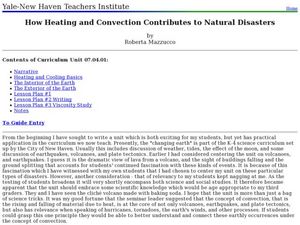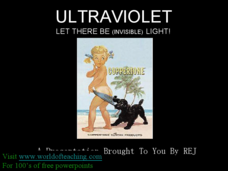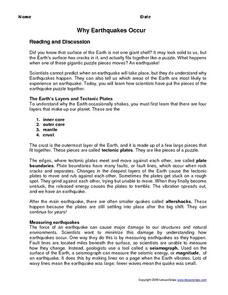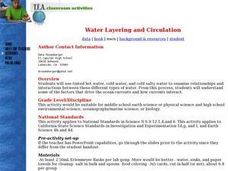Curated OER
An Exploration on the Moon
In this Google Earth worksheet, learners search the site and answer short answer questions about the moon. Students answer 18 questions.
Curated OER
How Heating and Convection Contributes to Natural Disasters
Students study the basics of heating and cooling and how it pertains to the earth. In this global instructional activity students read the Magic Tree House book then create a chart of their findings.
Curated OER
Ultraviolet Light
A few slides at the beginning of the presentation give the definition of ultraviolet light and some important dates in its research. The role of ozone in protecting Earth from excessive radiation is mentioned. Practical applications of...
Curated OER
Soil Layers
Ninth graders identify the different layers of soil. In this earth science lesson, 9th graders explain how limestone layers are formed. They identify the different parts of the coral colony.
Curated OER
Earth In Space Vocabulary Sheet
In this space science vocabulary worksheet, students read the definitions for 6 common terms. Students then look up 4 words and write the meanings. Students alphabetize the vocabulary words on another piece of paper.
Curated OER
Water Crossword Puzzle Worksheet
In this Earth science vocabulary worksheet, learners read 14 clues pertaining to water on this planet. Students fit their answers in a crossword puzzle.
Curated OER
Exploring Earth Through Maps and Technology
In this maps worksheet, learners read 3 pages of detailed information about maps, latitude, longitude, topography, satellites and global positioning. Students then answer 10 questions. There is also a research project assignment available.
Curated OER
Your Own Backyard
Pupils study Earth's features and their local environments. In this Earth's features lesson, students take a field trip to observe a natural environment and pupils sketch their observations of the nature. Students watch videos about...
Curated OER
Investigating the Soil
Students explore the Earth's crust by researching pH levels and acidity. In this environmental safety lesson, students identify the pros and cons of acidity within soil and how it affects plants. Students collaborate in a pH level...
Curated OER
Stratospheric Ozone
Students explore about the structure of Earth's atmosphere and about the stratospheric ozone. They discuss how it is produced and destroyed, where it is located, why it is important, and how it is changing. Students investigate about...
Curated OER
Incorporating 3D Visualizations into Your Classroom
Young scholars make observations through 3-D visualizations. They explore scientific and geologic processes through the use of 3-D pictures.
Teach Engineering
What's Wrong with the Coordinates at the North Pole?
Here is an activity that merges technology with life skills as individuals use Google Earth to explore the differences between coordinate systems and map projections. The self-guided instructional activity is the fourth segment in a...
Science Matters
Earthquakes and Volcanoes Pre-Assessment
See how much your class knows about earthquakes and volcanic activity and how these events shape geologic features. The first lesson in the series of 20 is a pre-test to find out what pupils already know. It includes 10 vocabulary...
Science Matters
Finding the Epicenter
The epicenter is the point on the ground above the initial point of rupture. The 10th instructional activity in a series of 20 encourages scholars to learn to triangulate the epicenter of an earthquake based on the arrival times of...
Teach Engineering
An Introduction to Air Quality Research
Viewers are a PowerPoint are exposed to the idea that pollutants are in more than just the air we breathe. the presentation provides information about the layers of the earth's atmosphere and takes a look at the pollutants in the...
Howard Hughes Medical Institute
Determining the Size and Energy of the K-T Asteroid
Two different groups of scientists published scientific papers in 1980 offering proof of a large asteroid hitting Earth between the Cretaceous and Tertiary layers of ground. Scholars use a worksheet to analyze the same type of data as...
Science Matters
Earthquake Preparedness
Forty-five states and territories in the USA are at moderate to very high risk of earthquakes. The discussion-based lesson plan covers what to do before, during, and after an earthquake. The 14th lesson plan in the series includes...
Curated OER
Weathering and Soil Formation
A set of 27 slides systematically shows how weathering, erosion, and deposition contribute to soil formation. Both chemical and mechanical weathering are described, as are resulting soil layers and properties. There is no longer any need...
Curated OER
Why Earthquakes Occur
In this earthquake worksheet, students learn about why earthquakes occur. After reading the information, they answer the 12 questions in the packet. The answers are on the last page.
Curated OER
Water Layering and Circulation
Students examine relationships and interactions between different types of water. They experiment with colored water of different temperature and salinity and discuss how the results relate to real ocean currents.
Curated OER
Environmental Studies: The Environment Rocks!
Rock exploration, so exciting! After reading the book Everybody Needs a Rock, the class makes sandwiches to better understand that the Earth is made in layers. They then use a description of the 3 types of rock to conduct an observation...
Curated OER
Understanding Lava Layers
Seventh graders trace the lava flow of an erupting volcano. In this earth science lesson plan, 7th graders experiment using baking soda and vinegar. They record and share their observations.
National Wildlife Federation
Why All The Wiggling on the Way Up?
Some of the CO2 emitted by burning fossil fuels is removed from the atmosphere by natural sinks, such as the ocean. The fifth engaging activity in the series of 21 examines the CO2 data from three very different locations. It then makes...
Curated OER
Seafloor Spreading
In this seafloor spreading worksheet, students use 12 given terms to complete sentences about the layers of the Earth and the components of the layers of the Earth.

























